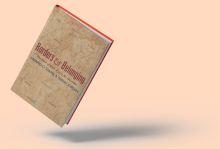naomi

WE ARE LIVING in shouty times. The pandemic has raised the decibels of public debate, as we bellow and bark at each other across social media. And while we initially may have imagined that the coronavirus would bring us together—and in some ways it has—in many ways our civic life has only become more fractured and fragile. The murder of George Floyd last year unleashed a well of public grief and a wave of protests that revealed a widening political divide in the U.S., as did the Jan. 6 riot at the U.S. Capitol. And now vitriol over vaccines from an anti-science contingent threatens the hope of achieving herd immunity.
Perhaps, amid all this noise and tumult, the quiet biblical Book of Ruth has something powerful and profound to say, some reassuring balm and redemptive truth to offer our polarized world. Indeed, in the skilled hands of gifted poet Pádraig Ó Tuama and the late theologian Glenn Jordan, it is made new for our times. In Borders and Belonging, these two Irish men orbit the ancient narrative of a Moabite woman and her Jewish family, asking how “this apparently simple book situates itself at the very places where the tectonic plates of conflicted communities threaten to crack and split apart whole nations and societies.” With an eye to how Brexit-related tensions in Ireland threaten to reignite old conflicts and destroy a delicate peace, and as white nationalism gives rise to horrors in the U.S., Ó Tuama and Jordan explore the Book of Ruth’s extraordinary capacity to move us toward a different way of being in relation to one another, suggesting that “it offers us a way towards the healing of our fractures and the building of new and healthy relationships in the aftermath of trauma.”